Student Blog
Getting Involved
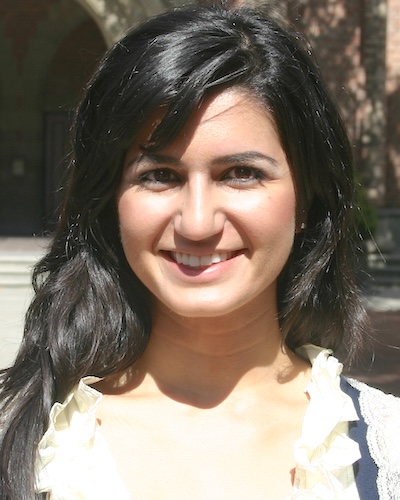
What makes USC’s program unique? ⟩
November 8, 2010, by Helen
Community Fieldwork Getting Involved International What are OS/OT?
The professors at USC support your learning in every way possible.
In the past couple weeks, I have held information sessions at UC San Diego, UC Davis, Sacramento State, and UC Berkeley. I am constantly being asked why I chose USC’s program and what makes USC’s program unique. From holding these information sessions and meeting so many ambitious and passionate future applicants I have had the opportunity to reflect more on the profession of Occupational Therapy. I have also had time to reflect on how attending USC’s program has influenced my professional future and outlook about the profession. The faculty at USC has such immense confidence in their students and provide the support for their students to not only be great clinicians, but to be leaders in their profession. This investment in the students is what has made my learning experience as a graduate student so unique.
In the last year, I have been provided with the opportunity to attend Lobby Day in Sacramento, advocating for Universal Health Care. Additionally, I was given the opportunity to do an international fieldwork in Ghana. I have also had the opportunity to attend OTAC conference in Pasadena, AOTA conference in Florida, as well as the student conclave in Kentucky. Attending these events, networking with current practitioners and leaders in the field, and learning what direction research is moving towards, have intertwined to inspire me about my profession. I am so proud to be an Occupational Therapy student at USC and am so grateful for being able to attend a university where the faculty truly supports your learning. The professors and faculty hold a holistic view of their students, emphasizing that it is not only valuable to be an excellent student doing well academically, but it is equally valuable to gain practice experience, leadership experience, research experience, and to be knowledgeable about the theory behind practice. By valuing all these learning components, I have a strong sense of the history of my profession, where we stand currently in our health care system, and what needs to be done in the future. The field of Occupational Science was founded at USC, Jane Ayres was a professor at USC researching Sensory Integration techniques, Lifestyle Redesign was established at USC, and our dean Florence Clark is the president of the AOTA. So to answer the question of why I chose USC and why I feel USC is ranked so highly for our OT program, I feel that it is because all these elements combine to create passionate practitioners who think broadly about the field of Occupational Therapy.
⋯
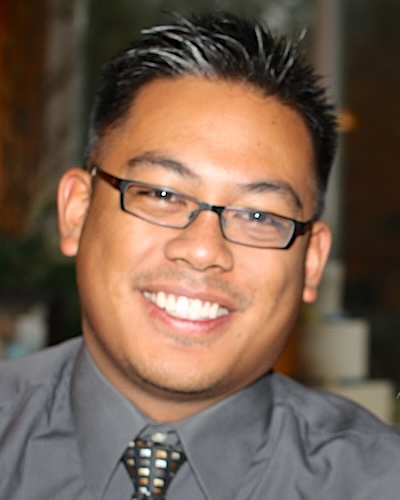
OTAC Conference this year ⟩
October 18, 2010, by Pierre
Getting Involved
This year was a great year to go! I was able to last Friday and attend 2 interesting seminars. 1 — Constraint induced therapy (facilitating use of a persons affected side and limiting the opportunities of the unaffected side) and 2 — Zones of regulation (assisting children/adolescents in recognizing the patterns of their behaviors, the triggers, and how to respond with the expected social behavior).
Lots of free goodies, lots of vendors, and a lot of members! It’s great to hear that our state association membership is growing and that our profession is slowly becoming more recognized within the public arena. With so much opportunity in every area of our society and workplace, I can’t wait to graduate and start working. Where am I interested in working? Pediatrics. I will post some blogs to give updates on my part-time fieldwork!
Until then, fight on USC OT!
⋯

Why did you choose to study OT? ⟩
September 30, 2010, by Helen
Getting Involved What are OS/OT?
Everyone asks, “What made you choose Occupational Therapy?”
Throughout my academic career, I always knew I wanted to work in a helping, health profession. In high school, I did room visits at the local rehabilitation hospital listening to patients, asking about their day, and opening myself up to the patients’ histories, family circumstances, and their concerns for the future. I organized a group called the Musical Bridge to bring a source of music and energy to those rehabilitating. For six years, I organized monthly recitals in the rehabilitation hospital. By adding a source of entertainment to the daily lives of the patients, I felt that I could, in an acute sense, promote their emotional and mental health.
Later in high school, I watched my grandfather slowly lose all independence to his dementia. While watching the persistence of my grandfather’s character despite experiencing such a devastating neurological disorder, I realized the value of resiliency. As a fourteen year old, I knew that I wanted to dedicate my professional future to the field of rehabilitation in some way. I am fascinated by people, their perspectives, and how no two individuals internalize and experience the same circumstance identically. My passion is studying developmental processes and the genetic, social, and socioeconomic factors that intertwine to influence one’s process of growth and attaining independence. Everything I have done up to now has been part of my efforts to help individuals rehabilitate and retain independence in their daily lives.
During my undergraduate studies, I took it upon myself to volunteer at as many rehabilitation settings as possible to determine where my strengths would best be utilized. I volunteered at pediatric clinics, geriatric gyms, rehabilitation hospitals, at an adult day health center, in addition to shadowing therapists in the school district. Through volunteering at these different sites, I realized that Occupational Therapy was a field that truly intertwined everything I loved about the rehabilitation process. Occupational Therapists were able to take the time in learning the client’s past, understanding how their condition affects the present, and set goals that would maximize function for the future. By utilizing the client’s interests to drive therapy, the Occupational Therapists I observed were able to provide motivation when patients were at their weakest points.
My most influential internship was at an adult day center working closely with clients who had been affected by various unpredictable circumstances. There is one gentleman, whom I will call John, who tremendously influenced my drive to pursue Occupational Therapy as a profession. His short term memory and motor skills have been significantly impaired due to anoxia after Cardiac Arrest. I worked with him on the piano, actively watching his progression from not recognizing notes to once again being able to sight-read very simple sheet music. While John may not have recognized me when he saw me every week, and despite him staring at me blankly as I made eye contact with him and asked him if he would “like to play piano today,” he would excitedly follow my lead into the therapy room. As I adjusted his chair, making sure that he could comfortably reach the keys, he sat patiently waiting to be presented with sheet music to play. As our piano session would end and I walked John back to his familiar seat, at his familiar table, I would say “It was nice playing piano with you today” and he would nod his head yes. After ten months of playing the piano with the therapist and me on a weekly basis, John was able to retain significant amounts of motor control, develop his postural balance, his distal control, and increase his visual motor skills. All these developments were possible because the therapist had best understood John’s therapeutic currency — his occupation.
It is an understatement to argue the power of a positive mentality and the outcome of hard work. Every patient I have seen has influenced my own perspective and the way I approach personal issues in my life. Through USC, I have had opportunities working in pediatric occupational therapy, acute inpatient occupational therapy, in the school districts, as well as an international fieldwork experience in Ghana. Additionally, I have been exposed to the value of professional advocacy and health care politics. By having a strong sense of the theory behind practice, intertwined with hands on experience, I become increasingly passionate about the field of Occupational Therapy the more I learn. I do not hope to merely attain a graduate degree, but rather lead an energetic practice and continue personal research in the fields of development and rehabilitation. Occupational Therapy allows me to take a holistic view of each client to assess every client’s strengths and limitations and develop a plan of care which addresses their goals and maximizes function. I have gained that this trust and respect of the client as a person provides the foundation of therapy. Being a vital component of an individual’s process of rehabilitation energizes my pursuit of Occupational Therapy. Whether it is my grandfather or John, as a future Occupational Therapist, I hope to always project the same humility and motivation that I have learned from the clients I have worked with.
⋯
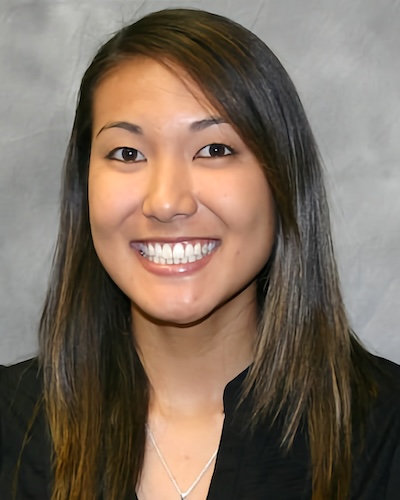
Looking Back: 2nd Year → Graduation! ⟩
May 14, 2010, by Mari
Beginnings and Endings Getting Involved School/Life Balance
2nd Year of OT school!
There is so much that I could talk about within the last few weeks, let alone, my whole second year! I can’t believe that’s it’s already time to graduate! Have you ever felt that you had so many things to do and just not enough time to do it all?! I imagine many people can relate. That’s how I felt for the last month of this past semester. Not only was I trying to keep up with my weekly school work, I was preparing to take our comprehensive exam at the end of the year and thinking about my summer fieldwork, which I will be going to Hawaii (my home) for. Just a few weeks ago, I was wondering how I would ever get it all done, and now, I will be graduating! The comp exam, which covers all our second year material and is required to pass in order to graduate, is finally done — what a relief! Although I was really nervous for it, as I am with any exam, I felt assured that I had learned all the material once before, so I should do well. To find out that I passed was the last thing before graduation! Tomorrow, we will be graduating as the USC OT Class of 2010!! We’re making history! Next for me is my last level II fieldwork, which will be on the outpatient service at a hospital in Hawaii where I’m from. I’m so excited to be moving home! It’s really weird because I’ve been in California for a while, but I think I’m about ready to move on to this next chapter in my life! Looking back on my second year, there are so many things that happened, it’s hard to capture it all in one blog. I will post a few pictures of some of my favorite memories!
In November, last fall, I had the opportunity to attend the AOTA Student Conclave, which was held in Baltimore. I travelled with Grace, a fellow OT student and along with going to to conference, visited friends, toured D.C., and lobbied on Capital Hill Day at Senator Boxer’s office (see picture below). It was a lot of fun and a good break before the semester finished. I enjoyed spending time with my classmates outside of class and getting connected with the OT community. It was a great experience and I highly recommend it if you get the opportunity to go to something like that!
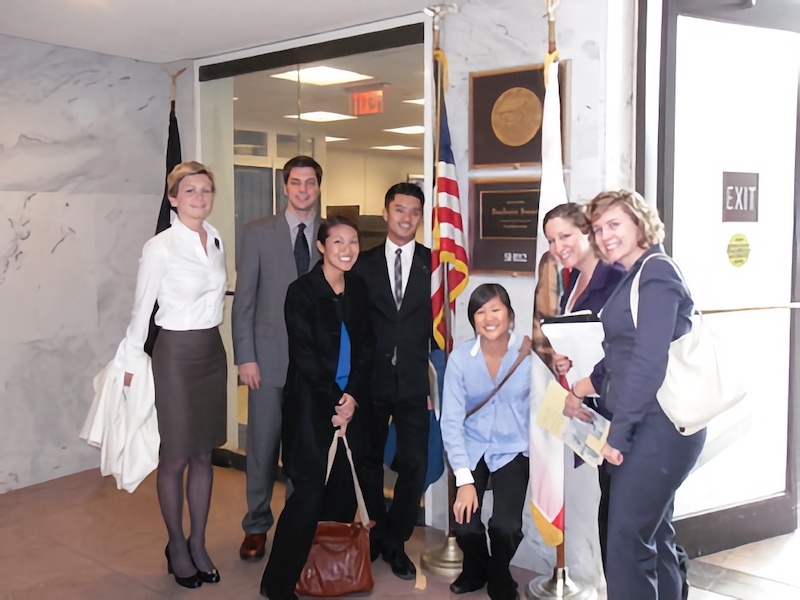
Another fun break toward the end of the fall semester was going to my very first and only USC football game! It was so much fun to hang out with friends and have the “real” USC experience! I was able to go to the USC v. UCLA game, and we won!! It was a great end to the semester, even though the football team didn’t do as great as they usually have done in the past! I’m not sure I’ll ever be able to go to another USC football game, although USC does play UH (University of Hawaii) at Hawaii in their season opener next season! So, we’ll see!
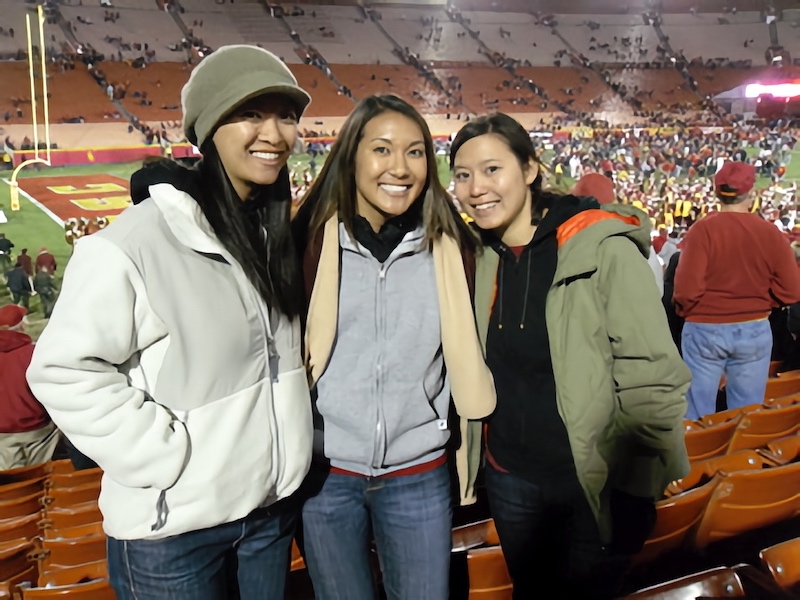
Throughout the whole second year, as you probably already know, I was a student ambassador for our department, along with Sarah, Michelle, Myka, and Gus. It was truly a great experience for me to work close with our recruitment office. We were all able to do grad fairs, information sessions, recruitment for our Occupational Science minor classes, tabling events at the main USC campus, and many more fun events to promote OT! Having the opportunity to do this has made me even more passionate about my profession! It gets me so excited to talk to others about what OTs do because of the great services that OTs can offer almost everyone! Besides work, it was a great time to get to know the other ambassadors and we have really become a lot closer through our experiences together!
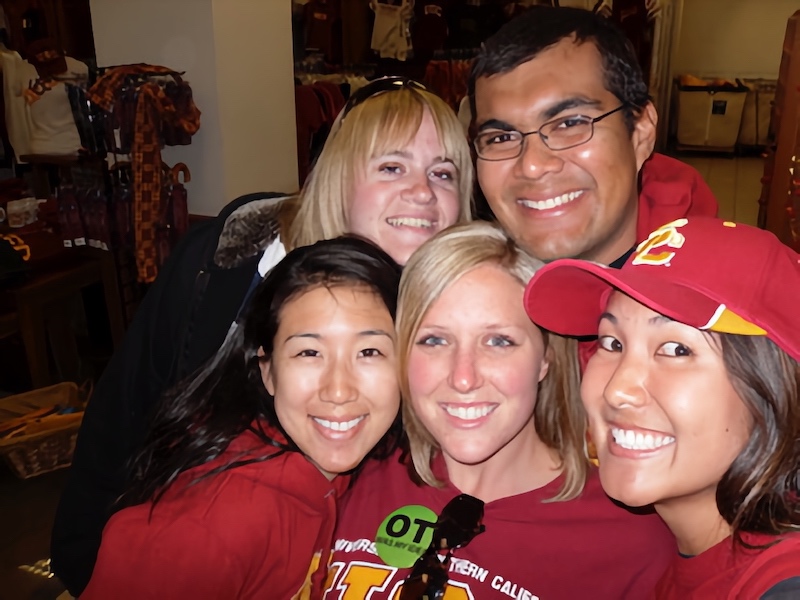
And finally, OT banquet! What a beautiful way to end the semester, year, and OT program — yummy food, great people, fun music and dancing!! Although not everyone in our class could attend, it was a fun night to get together and just relax after our comp exam! We only talked about the exam a little, but we were able to fully enjoy the night anyway, despite not knowing if we had passed yet!
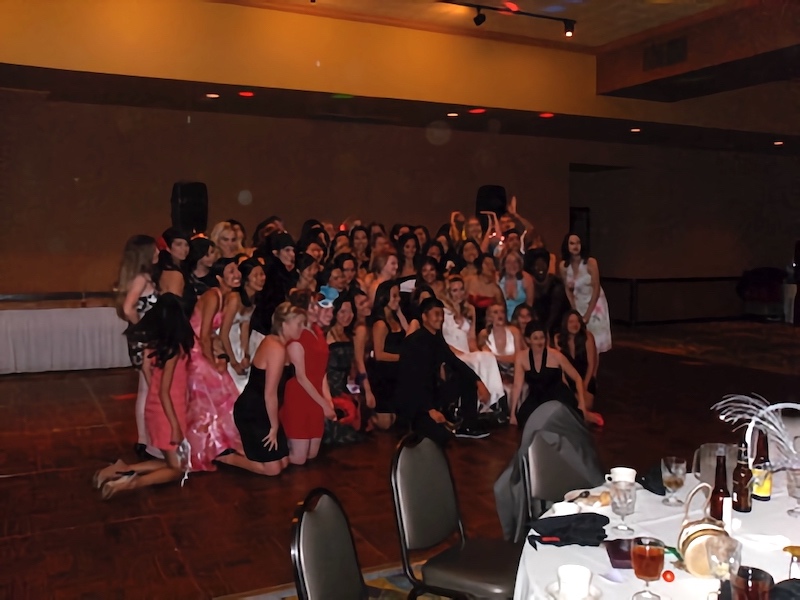
Thank you for reading our blogs! I know the ambassadors next year will do an amazing job to continue what we have been doing! I hope you’ve enjoyed it! =)
⋯
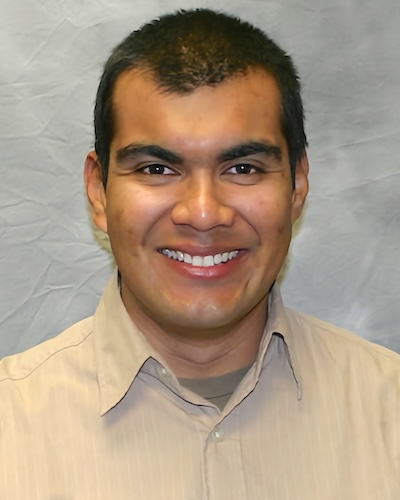
It all winds down . . . ⟩
May 10, 2010, by Gustalvo
Fieldwork Getting Involved Living in LA School/Life Balance What are OS/OT?
So, I’ve passed my comprehensive exam (i.e., comps), I’ve recently come back from AOTA’s 90th National Conference in Florida, and I am looking forward to one more fieldwork this summer — I feel pretty satisfied with myself right now. 😊
These last couple of weeks have been intense with papers, exams, and comps. But I survived, and part of what has helped me is reading and playing music. I’ve been able to squeeze in some leisurely reading (Alice’s Adventures in Wonderland), play some gigs with my mariachi ensemble, and jam on my own. Speaking of playing gigs, the mariachi that I’m in, Mariachi Sur de California, recently played a few gig on 5 de Mayo one of which was really fun; Los Angeles Southwest College put on a 5 de Mayo event on their campus for local elementary school children. The band had never had a crowd that was so in to the music, just about everyone stood up; children clapped, people sang — it was the most gratified I’ve ever felt at a gig. Also, we played at a church for Mother’s Day; that too went very well. It feels good to be playing and engaging in one of my most favorite occupations.
I also like to record on my free time, but lately I haven’t been able to and so I just jam on my own and I keep practicing snippets of ideas that I come up with so that I can record them over the summer when I have some time.
I can’t wait to get to get this summer started; you could say that I’m about to embark on my dream fieldwork experience. I’m interested in going in to the field of mental health, preferably in community mental health settings, but I also am interested in phys-dys. So, long ago when I was picking out my top ten choices for this summer’s fieldwork I spoke with Jaynee, our Fieldwork Coordinator, about what I wanted and she really helped me out in finding locations to pick from; she brought up transitional living centers (TLCs). I was excited about this for I had observed a TLC during one of my earlier rotations. A TLC basically helps individuals that have come out of inpatient acute rehab to reintegrate themselves back in to their communities. It involves facilitating how to get around, going grocery shopping, and helping them organize their day so that they may be independent among other things. To me it’s the perfect balance between the two worlds I want to combine, though mental health is and can be applied in any setting at any moment, I think the TLC will be a great fit for me!
OH! also, about a week ago I went to AOTA’s national conference in Orlando! It was a great experience. There was a workshop that caught my attention which I’m glad it did: “Engaging Marginalized Populations Through Qualitative Research.” This was one of the the most up was one of the most interesting workshops I attended. It touched about understanding the experience of marginalized populations, and how these experiences influence their occupational choices and participation. There were three speakers each touching upon the experiences of the the undocumented in the US, people suffering from obesity, and women who have just come out of incarceration. Learning of how stigmas influences these populations occupational choices and participation was very eye opening to me and has further encouraged my desire to do research in the future. The Q&A afterward was very engaging as well. I think the main take home message was that as OTs we need to advocate for populations that are suffering from occupational injustices**. That in addition to advocating for our profession we must also prioritize advocating for populations in need of occupational therapy and break the borders that currently create this schism between OT and underserved populations! It was a very exciting, uplifting, and refreshing workshop to say the least, and it was very unfortunate to see that so few people attended!
This conference was significant not only because it was my first, but also because Dr. Florence Clark was inaugurated as AOTA’s president! Congratulations Dr. Clark!
Anyway, I’m “walking” this Friday and I’m very excited, but also a little stressed since my cap & gown have yet to arrive!!! But I’m sure all will be fine, as everything always does!!
**Occupational justice = the concept that, to develop and thrive, humans are beings that need and want to participate in occupations. So, when there’s an occupational injustice due to a disability or environment, the focus is to enable these populations/individuals to access opportunities and resouces so that they may develop and thrive.
⋯





